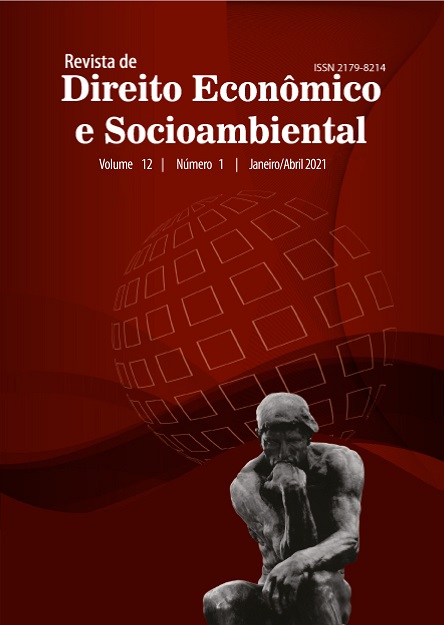Extended Producer Responsibility as an instrument to achieve an effective circular economy. Approach to EU legislation and the Spanish law on waste and contaminated soils
DOI:
https://doi.org/10.7213/rev.dir.econ.soc.v12i1.28613Keywords:
circular economy; extended producer responsibility; environmental law; climate change; waste law.Abstract
This paper critically analyses Extended Producer Responsibility (EPR) as an instrument to achieve an effective circular economy. To this end, we study its conceptualisation, regulation and evolution. This instrument requires constant revision in order to achieve the effective minimisation of waste, focusing on prevention, especially on the durability of products. Firstly, we study its initial configuration in Directive (EU) 2008/98, Waste Framework Directive (WFD), as a new instrument, and in Law 22/2011, on waste and contaminated soils (LRSC), which transposed it into Spanish law, as well as in the royal decrees that develop it. Secondly, we study its new configuration after the modification of the WFD by Directive (EU) 2018/851, as a result of the Circular Economy Action Plan of 2015, as well as in Directive (EU) 2019/904, on the reduction of the impact of certain plastic products on the environment. Thirdly, we present the main proposals of the preliminary draft of the LRSC, and, finally, some concluding thoughts and recommendations.
Downloads
References
ALENZA GARCÍA, José Francisco. El nuevo régimen legal de los residuos. En BLASCO HEDO, Eva (Coord.), La nueva ley de residuos y suelos contaminados, CIEDA-CIEMAT, 2013.
ALENZA GARCÍA, José Francisco. La economía circular en el derecho ambiental. Actualidad Jurídica Ambiental, núm 102, 2, 2020, pp. 225-249.
ATASU, Atalay. Operation perspectives on extended producer responsibility. Journal of Industrial Ecology. 1, 7, 2018.
CAMPBELL-JOHNSTON, Kieran, FRIANT, Martin Calisto, THAPA, Kaustubh, LKERVELD, Dirkjan, VERMEULEN, Walter J.V. How circular is your tyre: Experiences with extended producer responsibility from a circular economy perspective”, Journal of Cleaner Production, Elsevier, 270, pp. 122042, 2020.
ELLEN MACARTHUR FOUNDATION, Growth Within: a circular economy vision for a competitive Europe, 2015.
GUI, Luyi, ATASU, Atalay, ERGUN, Özlem, TOKTAY, L. Beril. Design incentives under collective extended producer responsibility: a network perspective. Management Science, 64 (11), 1e22, 2018.
HUANG, Ximin (Natalie), ATASU, Atalay, TOKTAY, L. Beril. Design implications of extended producer responsibility for durable products”, Management Science, Vol. 65, issue, 6, 2019, pp. 2445-2945.
KUNZ, Nathan, MAYERS, Kieren, VAN WASSENHOVE, Luk. Stakeholder views on extended producer responsibility and the circular economy. Special Issue on the Circular Economy, California Management Review, 60 (3), 2018, pp. 45-70.
LOZANO CUTANDA, Blanca. “Directiva (UE) 2019/904, del parlamento europeo y del consejo, relativa a la reducción de determinados productos de plástico en el medio ambiente”, Actualidad Jurídica Ambiental, n. 93, sección “comentarios legislación”, 2019.
NOGUEIRA LÓPEZ, Alba. Cuadrar el círculo. Indret: Revista para el análisis del Derecho, núm. 3, 2019.
MAITRE-EKERN, Eléonore. Re-thinking producer responsibility for a sustainable circular economy from extended producer responsibility to pre-market producer responsibility, Journal of Cleaner Production, Elsevier 286, 2021.
POUIKLI, Kleoniki C. Concretising the role of extended producer responsibility in European Union waste law and policy thorugh the lens of the circular economy, ERA Forum, n. 20, 2020, pp. 491-508.
PUENTES POCIÑA, Beltrán. ¿España Circular 2030? Comentario al borrador de la estrategia española de economía circular. Revista Catalana de Dret Ambiental, vol. 9, núm.2, 2018.
SANTAMARÍA ARINAS, René Javier. Economía circular: líneas maestras de un concepto jurídico en construcción. Revista Catalana de Dret Ambiental, vol. 10, núm. 1, 2019.
SERRANO LOZANO, Rubén. Capítulo IV. Algunas cuestiones en torno a la responsabilidad ampliada del productor del producto: especial referencia a la gestión de los residuos. En GARCÍA-MORENO RODRÍGUEZ, Fernando (Dir.), Comentarios sistemáticos a la ley 22/2011, de 28 de julio, de residuos y suelos contaminados, Aranzadi, 2014.
WILLST, Henning, VON GRIES, Nadja, BAHN-WALKOWIAK, Bettina. From Waste Management to Resource Efficiency—The Need for Policy Mixes. Sustainability, 8, 622, 2016.
Downloads
Published
How to Cite
Issue
Section
License
Copyright (c) 2021 Aitana de la Varga Pastor

This work is licensed under a Creative Commons Attribution-NonCommercial 4.0 International License.
Authors who publish in this Journal agree to the following terms:
- Authors retain copyright and grant the Journal of Economic and Socio-Environmental Law the right of first publication with the article simultaneously licensed under the Creative Commons - Attribution 4.0 International which allows sharing the work with recognition of the authors and its initial publication in this Journal.
- Authors are able to take on additional contracts separately, for non-exclusive distribution of the version of the paper published in this Journal (eg.: publishing in institutional repository or as a book), with a recognition of its initial publication in this Journal.
- Authors are allowed and encouraged to publish their work online (eg.: in institutional repositories or on their personal website) at any point before or during the submission process, as it can lead to productive exchanges, as well as increase the impact and the citation of the published work (see the Effect of Open Access).





















